NEW BEGINNINGS
“You are bafu!” is an insult hurled many times throughout Danai Gurira’s new play The Convert. Bafu means traitor; in this context, it is used to describe Africans who collaborate with Europeans in ways that go against tribal customs. Much of the drama in The Convert centers on those who are considered traitors by their own people. They are in the unenviable position of being neither one thing nor the other, neither European because of the color of their skin nor African because of their adoption of European customs. Since the principal characters in this play are a young missionary and his convert, it is as much about religion as tradition and culture.
Many books, plays and films dramatize the missionary enterprise that often went hand in hand with its colonial counterpart, or vice versa. Of these dramatizations, the majority take sides, either praising the missionaries or criticizing them. The reality, however, was much more ambivalent, and The Convert sensitively presents for consideration this ambivalent process of evangelization and colonization.
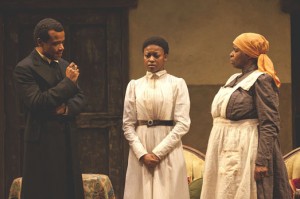 Set in Salisbury, Rhodesia (modern-day Harare, Zimbabwe) between 1895 and 1897, the play switches back and forth between English and, as it’s referred to by certain characters, the “vernacular.” Danai Gurira, who was born in the US to Zimbabwean parents and raised in Zimbabwe, speaks the Shona language, and it would seem likely that this is the vernacular used in The Convert, but it doesn’t make sense why the playwright has not made explicit what this language is in her play. Apart from occasional translations naturally provided in the play’s dialogue, the audience is left guessing at what is being said. Fortunately, this does not significantly detract from the play’s intelligibility.
Set in Salisbury, Rhodesia (modern-day Harare, Zimbabwe) between 1895 and 1897, the play switches back and forth between English and, as it’s referred to by certain characters, the “vernacular.” Danai Gurira, who was born in the US to Zimbabwean parents and raised in Zimbabwe, speaks the Shona language, and it would seem likely that this is the vernacular used in The Convert, but it doesn’t make sense why the playwright has not made explicit what this language is in her play. Apart from occasional translations naturally provided in the play’s dialogue, the audience is left guessing at what is being said. Fortunately, this does not significantly detract from the play’s intelligibility.
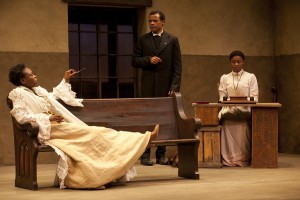 Gurira strives for realism, and masterfully achieves it (Carrie Hughes is the dramaturg); characters do not address the audience, whether in long speeches or in short asides. When they speak, it is in their own language, dialect and accent. Their speech patterns in English are not those of native speakers. They say things like, “Be of silence” and “Are you in understanding?” They pronounce L’s like R’s, and can’t form the letter V. The ability to use language effectively is a major distinguishing mark between characters.
Gurira strives for realism, and masterfully achieves it (Carrie Hughes is the dramaturg); characters do not address the audience, whether in long speeches or in short asides. When they speak, it is in their own language, dialect and accent. Their speech patterns in English are not those of native speakers. They say things like, “Be of silence” and “Are you in understanding?” They pronounce L’s like R’s, and can’t form the letter V. The ability to use language effectively is a major distinguishing mark between characters.
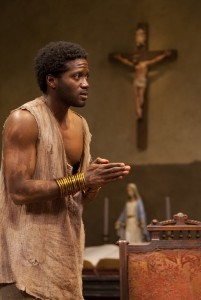 The historical background of The Convert has been meticulously researched. For those not familiar with the history of Zimbabwe, it might come as a surprise to learn that the region’s early evangelists were not English Evangelicals, Dutch Calvinists or American Baptists, but Irish Catholics – more specifically, Jesuits. Chilford (Leroy McClain), one of The Convert‘s principal characters, is a young black man raised by these Jesuit missionaries. He dresses like an Englishman of the period, in a dark suit and frock coat, though wearing a broad-brimmed soup plate hat more reminiscent of an Italian priest (beautifully rendered costumes by Paul Tazewell). Although English is not his mother tongue, which he no longer speaks, he still retains a bit of an accent. When he hears that a fellow African has just been ordained to the priesthood, he cannot contain his excitement. It is something he has greatly desired, but never dreamed possible.
The historical background of The Convert has been meticulously researched. For those not familiar with the history of Zimbabwe, it might come as a surprise to learn that the region’s early evangelists were not English Evangelicals, Dutch Calvinists or American Baptists, but Irish Catholics – more specifically, Jesuits. Chilford (Leroy McClain), one of The Convert‘s principal characters, is a young black man raised by these Jesuit missionaries. He dresses like an Englishman of the period, in a dark suit and frock coat, though wearing a broad-brimmed soup plate hat more reminiscent of an Italian priest (beautifully rendered costumes by Paul Tazewell). Although English is not his mother tongue, which he no longer speaks, he still retains a bit of an accent. When he hears that a fellow African has just been ordained to the priesthood, he cannot contain his excitement. It is something he has greatly desired, but never dreamed possible.
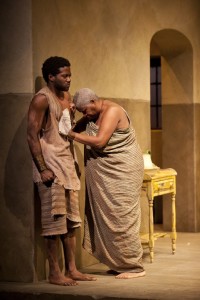 Into Chilford’s life walks Jekesai (Pascale Armand), the titular convert of Gurira’s play. Rescuing her from an arranged marriage to a much older man who has multiple wives, Chilford renames the young girl Esther and installs her in his household as a maidservant and soon-to-be protege. As a mark of her gratitude, Esther works hard, learns English and accepts her master’s religion, European dress and way of life. Whereas Chilford took on European ways from a young age and has long mastered the transition, Esther struggles to change and adapt herself to fit her new context. For her, becoming a convert means more than simply negotiating a new identity as an African Christian, amidst the competing claims of Christian belief and ancestral custom. It means struggling to be true to herself, of not becoming subsumed into others’ expectations of her and for her.
Into Chilford’s life walks Jekesai (Pascale Armand), the titular convert of Gurira’s play. Rescuing her from an arranged marriage to a much older man who has multiple wives, Chilford renames the young girl Esther and installs her in his household as a maidservant and soon-to-be protege. As a mark of her gratitude, Esther works hard, learns English and accepts her master’s religion, European dress and way of life. Whereas Chilford took on European ways from a young age and has long mastered the transition, Esther struggles to change and adapt herself to fit her new context. For her, becoming a convert means more than simply negotiating a new identity as an African Christian, amidst the competing claims of Christian belief and ancestral custom. It means struggling to be true to herself, of not becoming subsumed into others’ expectations of her and for her.
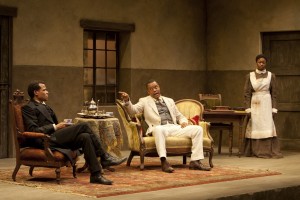 Center Theatre Group, which co-commissioned The Convert, brings Gurira’s vision beautifully to life at the Kirk Douglas Theatre. While this is a world premiere production, The Convert‘s run at in L.A. does not mark its debut, which occurred earlier this year both at McCarter Theatre Center on the East Coast and at the Goodman in Chicago. The impeccable design team includes Daniel Ostling (sets), Lap Chi Chu (lighting), and Darron L West (sound).
Center Theatre Group, which co-commissioned The Convert, brings Gurira’s vision beautifully to life at the Kirk Douglas Theatre. While this is a world premiere production, The Convert‘s run at in L.A. does not mark its debut, which occurred earlier this year both at McCarter Theatre Center on the East Coast and at the Goodman in Chicago. The impeccable design team includes Daniel Ostling (sets), Lap Chi Chu (lighting), and Darron L West (sound).
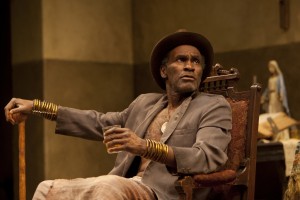 The acting is not merely faultless, but powerful and moving; the foreign languages and dialects are spoken with ease by the all-black cast (dialect coaching by Beth McGuire). Guided by director Emily Mann, the timing is perfect, which cannot have been easy to achieve with some of the more complicated scenes, where multiple characters are shouting all at once. Although the men slightly outnumber the women in the cast, it is the latter who dominate, thanks to Gurira’s writing and the commanding performances of Pascale Armand, Cheryl Lynn Bruce and Zainab Jah. Armand is quite charismatic and convincing as a convert, and she looks equally at home half-naked as Jekesai and fully-dressed as Esther. Among the male actors, Warner Joseph Miller gives an outstanding performance as Tamba, portraying a desperate young man who gets caught up in tribal rebellion against the whites and undergoes a heartbreaking crisis of masculinity.
The acting is not merely faultless, but powerful and moving; the foreign languages and dialects are spoken with ease by the all-black cast (dialect coaching by Beth McGuire). Guided by director Emily Mann, the timing is perfect, which cannot have been easy to achieve with some of the more complicated scenes, where multiple characters are shouting all at once. Although the men slightly outnumber the women in the cast, it is the latter who dominate, thanks to Gurira’s writing and the commanding performances of Pascale Armand, Cheryl Lynn Bruce and Zainab Jah. Armand is quite charismatic and convincing as a convert, and she looks equally at home half-naked as Jekesai and fully-dressed as Esther. Among the male actors, Warner Joseph Miller gives an outstanding performance as Tamba, portraying a desperate young man who gets caught up in tribal rebellion against the whites and undergoes a heartbreaking crisis of masculinity.
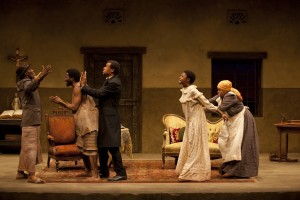 The Convert is a long play, lasting more than three hours. Yet the drama is so utterly absorbing, and broken up by two short intermissions, that the performance easily holds the audience in rapt attention. While the first two acts are more satisfying than the final third, this is likely because of the complicated and somewhat ambivalent ending. Without giving it away, one can simply say that Gurira’s conclusion is neither a triumphant vindication of the missionary endeavor nor a stubborn adherence to tribal custom, but strives for a middle ground. To fully appreciate the ending, and everything that leads up to it, one should probably watch The Convert more than once. As it is the first part of a projected Zimbabwean trilogy, for which Danai Gurira received a NEA New Play Development grant in 2010, we can look forward to more soul-searching drama from her pen in the near future.
The Convert is a long play, lasting more than three hours. Yet the drama is so utterly absorbing, and broken up by two short intermissions, that the performance easily holds the audience in rapt attention. While the first two acts are more satisfying than the final third, this is likely because of the complicated and somewhat ambivalent ending. Without giving it away, one can simply say that Gurira’s conclusion is neither a triumphant vindication of the missionary endeavor nor a stubborn adherence to tribal custom, but strives for a middle ground. To fully appreciate the ending, and everything that leads up to it, one should probably watch The Convert more than once. As it is the first part of a projected Zimbabwean trilogy, for which Danai Gurira received a NEA New Play Development grant in 2010, we can look forward to more soul-searching drama from her pen in the near future.
photos by T Charles Erickson
The Convert
Center Theatre Group at the Kirk Douglas Theatre in Culver City (Los Angeles Theater)
scheduled to end on May 19
for tickets, visit http://www.centertheatregroup.org

